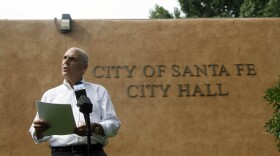
Kaveh Mowahed
Reporter, News HostKaveh Mowahed has filled several roles in ¾ÅÉ«Íø’s news department over the years while working toward a PhD in the History of Medicine at UNM. He started as an intern in 2013 and has been a reporter, producer, host, and data analyst with us since then. Kaveh studied print journalism at Arizona State University, but soon after earning a bachelor’s degree he found his love for radio. Kaveh thinks hearing is the most valuable of the senses because of how it engages the imagination. When he’s not reporting or editing audio for the radio, he loves being home listening to records or romping around the mountains on a bicycle or snowboard.
-
Let’s Talk New Mexico, 10/30/25 There are about twenty data centers in our state, including a big one owned by Meta in Los Lunas. They’re also in Albuquerque, Taos, Clovis and Sunland Park, and the rush is on to build more. However, people who live nearby worry about water and energy usage, and whether these developments really benefit their communities.
-
Early voting will start soon and run through November 1st, and several cities in our area will choose new mayors. Old fashioned images of mayors have them greeting families on downtown streets, checking in on local businesses and directing city police, but is that really how they spend their days?
-
The end of summer comes with a welcome drop in temperatures, leaves starting to change color, and the smell of roasting chile in the air. Farmers are busy and so are farmer’s markets. It’s harvest time.
-
Whether you live in Albuquerque, or down South, or in Santa Fe, or cooler areas that historically haven’t been their home, a warming climate is leading to a broader range and longer season for mosquitoes and other pests.
-
President Trump’s One Big Beautiful Bill Act will cut incentives for wind, solar and electric cars and will ease restrictions on fossil fuels which contribute to a warming climate and severe weather. On the next Let’s Talk New Mexico we’ll ask, where does this leave our state as we grapple with renewable energy development while banking on oil and gas?
-
Our state's mountains, deserts, caverns and culture draw tourists from around the world, but a changing climate and more severe weather are threatening those places and that important part of our economy. How can we protect our natural and cultural treasures from fires and floods? Should we still visit places after a disaster hits?
-
Protests over social, economic, and corporate policies have become increasingly contentious, reflecting a society that feels as divided as ever. Still, the act of speaking out has deep roots in our region. On the next Let’s Talk New Mexico we’ll discuss protests. Do they work? Which strategies are most effective? How have they evolved?
-
In previous weeks we’ve explored the effects on our state of federal workforce reductions and likely federal funding cuts to Medicaid. Now prominent organizations like the New Mexico Humanities Council are reeling from cancelled federal grants. On the next Let’s Talk New Mexico, how will our non-profits endure big losses of federal funding promised by congress?
-
About a third of New Mexicans depend on medicaid to pay for health care. While our state legislature has signalled support by passing a bill to create a new medicaid trust fund, the United States congress is debating deep cuts to spending, including on medicaid. On the next Let’s Talk New Mexico, how would federal cuts affect health care in our state?
-
With only a couple of weeks left in this legislative session and about 20 bills to update regulations on oil and gas, where does New Mexico stand on greenhouse gas-contributing fossil fuels? On the next Let’s Talk New Mexico, we’ll discuss the latest from the Roundhouse when it comes to updating laws for those extractive industries.










